Nearly 20 years after the United States intervened in Afghanistan to remove the Taliban from power, and in the wake of President Joe Biden’s withdrawal of U.S. troops, the Taliban’s stunningly rapid reconquest of the country reached its denouement Sunday, August 15 as its fighters entered Kabul and President Ashraf Ghani left the country. Brookings experts reflect on the latest developments and offer recommendations on how the Biden administration should proceed.
 MADIHA AFZAL (@MadihaAfzal)
MADIHA AFZAL (@MadihaAfzal)
David M. Rubenstein Fellow, Center for Middle East Policy and Center for Security, Strategy, and Technology:
This weekend saw a stunning tragedy unfold in Afghanistan, at a staggering speed and scale. Afghanistan’s cities, and ultimately Kabul, fell like dominoes to the Taliban. We have seen haunting images of Afghans flooding Kabul airport, desperate to leave their country, of planes taking off around them. These will endure.
There is plenty of blame to go around, and no doubt we will spend a great deal of time trying to understand who went wrong, where. President Donald Trump negotiated a feckless deal with the Taliban. President Biden insisted on an unconditional withdrawal, which ensured the Taliban had no incentive to talk peace. President Ghani’s corrupt government and his military leaders failed to lead the Afghan security forces. The rapidity of the American withdrawal this summer meant the rug was pulled out from under the Afghan security forces, who depended heavily on U.S. intelligence and air support. And there’s more, including the influence of Afghanistan’s neighbors. What is clear the day after the fall of Kabul is that the world has collectively failed the Afghan people.
Biden, both on the campaign trail and as president, promised a responsible withdrawal. This has been anything but. Throughout the weekend, I looked for a word of reassurance to the Afghan people from the Biden administration — but beyond trying to help those who had worked directly with the U.S., there was nothing, not even a mention of humanitarian support. They’ve been abandoned to an unknown fate, to be ruled by those who terrorized them.
 RANJ ALAALDIN (@RanjAlaaldin)
RANJ ALAALDIN (@RanjAlaaldin)
Nonresident Fellow, Center for Middle East Policy:
President Biden should establish immediate access and safe havens for the millions of Afghan civilians fleeing Taliban rule. Forming an international coalition dedicated to this effort may offer respite to the most vulnerable, including activists, journalists, and members of civil society who may now be targeted for working with the United States. The Taliban is a violent religious fundamentalist group. It will pay lip service to human rights but its promises should not be taken at face value. In violating the terms and spirit of the Doha peace talks, it has proven to be a dishonest negotiator, exploiting these talks to establish a lull in conflict that allowed it to reinforce its supply lines, organize its fighters, and prepare the staging ground for its offensive. Its atrocities over the coming period, including revenge killings and the violent suppression of women and other vulnerable communities, will require a unified response from the U.S. and its allies. Qatar, which facilitated the peace talks and could now have substantial influence over the Taliban, may be critical to any such strategy focused on pressuring the group and containing its transgressions. The Taliban will see little incentive to establish a peaceful transition, much less an inclusive political order, if the U.S. is unable to convince Pakistan, Russia, and China to isolate the group. Focus will be on how Washington can foster a response in tandem with its allies, but it is also imperative that Biden mobilizes a response in consort with Islamabad, Moscow, and Beijing.
 DANIEL L. BYMAN (@dbyman)
DANIEL L. BYMAN (@dbyman)
Senior Fellow, Center for Middle East Policy:
As the Taliban gain control of Afghanistan, one of the most important questions for the United States is whether al-Qaida will again use the country as a base for terrorist attacks, as it did in the pre-9/11 era. The Taliban has not broken with al-Qaida, despite tremendous pressure to do so.
At the same time, however, the risk for the Taliban of a high-profile al-Qaida attack against the United States is high, and the Taliban may prefer al-Qaida focus on what remains of the anti-Taliban resistance and other local enemies. Pakistan, too, has an incentive to push the Taliban to keep al-Qaida on a short leash. The al-Qaida core itself is weak, and in recent years has focused on regional civil wars more than international terrorism.
The United States has prepared to conduct attacks on al-Qaida (and Islamic State affiliate) bases and leaders in Afghanistan from nearby countries. This will be less effective than if the United States had a presence in Afghanistan, but it will still keep terrorist groups off balance. Aggressive intelligence gathering and regular strikes on terrorists using Afghanistan as a base will be even more necessary given the collapse of the Afghan government.
 GIOVANNA DE MAIO (@giovDM)
GIOVANNA DE MAIO (@giovDM)
Nonresident Fellow, Center on the United States and Europe:
Afghanistan is also a failure of NATO and the European Union. The United States and its allies were aware of the consequences of U.S. withdrawal. Yet the allies left as soon as they could, the result of a lack of basic equipment and logistic capabilities. If Europeans were serious about strategic autonomy they should have shown it there. The U.S. administration should have pushed on its allies to keep protecting the jurisdiction of the government in Kabul, and slowly proceed to a withdrawal. At this point it is too late; the only thing the U.S. could do is attempt a coordinated action with the EU, NATO, or the United Nations, to assist the Afghan population and negotiate arrangements with neighboring countries for anti-terrorism and humanitarian operations.
 VANDA FELBAB-BROWN (@vfelbabbrown)
VANDA FELBAB-BROWN (@vfelbabbrown)
Senior Fellow, Center for Security, Strategy, and Technology and Director, Initiative on Nonstate Armed Actors:
The tragedy in Afghanistan has long been in the making. The critical weaknesses in Afghan National Defense and Security Forces and parochial, self-interested governance centered on corruption and politicking instead of the country’s basic interests have been defining characteristics of Afghanistan for a decade and a half but were systematically unaddressed. Pakistan never stopped its multifaceted support for the Taliban. U.S. troops staying several years more would not have averted this moment, even if it would have delayed it.
The most immediate priority now is to maintain control of Kabul airport to assure U.S., international, and Afghan evacuations. The United States and the international community need to be engaging with the Taliban about preventing bloodshed in Kabul, delivering order and humanitarian assistance to internally displaced people without food and shelter, and avoiding purges and executions in months to come.
The United States should press for as much inclusivity in the Taliban government as possible, including of women, ethnic minorities, and technocrats. Washington should demand that women retain access to schooling and health care, at least some jobs, freedom to leave the household without a male guardian, and not be forcibly married off to Taliban fighters.
The U.S. has limited leverage, consisting of conditioning economic aid, recognition of the Taliban government, removal of sanctions from Taliban leadership, and allowing access to international financial systems and international institutions.
What lies ahead is not a happy picture. An Iran-like internal political and social order may be the best to hope for.
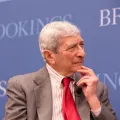 MARVIN KALB (@MarvinKalb)
MARVIN KALB (@MarvinKalb)
Nonresident Senior Fellow, Foreign Policy:
Years ago, during Henry Kissinger’s shuttle diplomacy in the Middle East, then Syrian President Hafez al-Assad told the secretary of state why he was optimistic about the ultimate outcome of the Arab-Israeli confrontation. “You Americans walked out on the South Vietnamese,” he said, according to what Kissinger told reporters on his plane. “You’ll give up on Taiwan, and eventually you’ll give up on the Israelis too.”
President Biden’s decision to “give up” on Afghanistan — apparently, a firm decision, unlikely to be changed, based on many years of disillusionment with Kabul’s ineffectiveness — follows a familiar script delightfully satisfying to despots and deeply troubling to allies everywhere.
Is America any longer a really reliable ally, a leader capable of rallying the world to common, desirable goals?
Presidents and prime ministers from Europe to Asia must now be asking themselves that question, and worrying.
Biden is in a terrible mess, committed to easing the COVID-19 menace and rebuilding the economy but also promoting democracy in its global struggle against authoritarianism. Can he succeed on both the domestic and foreign fronts on roughly the same timetable? The current flight from Kabul strongly suggests no.
Biden has made his choice, the most fateful of his administration. The fallout will be ugly. Polls say the American people are still behind him. When Taliban brutality appears nightly on TV screens, will that support hold? Leading to another question: Are moral considerations any longer a cornerstone of American policy?
 SUZANNE MALONEY (@MaloneySuzanne)
SUZANNE MALONEY (@MaloneySuzanne)
Vice President and Director, Foreign Policy:
The chaotic, precipitous collapse of the Islamic Republic of Afghanistan marks an ignominious end to the U.S. intervention there, with dangerous implications for the region and for America’s role in the world. That U.S. troops would withdraw was never in doubt — our role in Afghanistan’s conflict had long lost support from both sides of our polarized domestic debate, two previous administrations sought a negotiated denouement with the Taliban, and President Biden himself has been consistent and transparent in seeking to end two decades of American military presence in Afghanistan.
But, as is often the case in foreign policy, the devil is in the details. The Biden administration’s handling of our drawdown has been spectacularly poorly managed, leaving tens of thousands of Afghans who assisted the U.S. effort vulnerable to Taliban reprisals and a pivotal if perennially unstable country in the hands of a vicious religious cult. Biden is right to prioritize the urgent challenges posed by great power competition, the spread of techno-authoritarianism, the climate crisis, and other threats over sustaining a war that lost its purpose long ago. But his claims that “America is back” ring hollow against scenes of desperation as Afghans who put their faith in us scramble for any exit opportunity while Biden remains silent. And the catastrophe in Kabul undermines the central proposition of Biden’s foreign policy — that the U.S. will champion values and allies. Our adversaries are watching and drawing their own conclusions about American will and capacity, just as they did before 9/11.
 PATRICK W. QUIRK (@patrickwquirk)
PATRICK W. QUIRK (@patrickwquirk)
Nonresident Fellow, Center for Security, Strategy, and Technology:
The Taliban have penetrated Afghanistan’s halls of power and are on the verge of returning the country to a theocracy run by thugs. Countless more women, men, and children face the prospect of death at the Taliban’s hands or, should they survive, repressive rule.
The White House has limited options for meaningful impact that are also politically feasible. But there are steps it can take to head off even further bloodshed. These include using its skeleton diplomatic staff to evacuate local partners — NGO staff, military personnel, interpreters, and others — that the United States relied on for the past two decades.
More broadly, the Biden team should use Afghanistan’s collapse as a moment to reflect on what it wants to accomplish — rather than say — in standing up for democracy overseas. We have begun to see a gap between the administration’s rhetoric about making democracy central to its foreign policy, and what it has actually done on this front — from the events of the last week in Afghanistan to an insufficient response to Myanmar’s coup.
While the administration parses an invite list for the recently announced Summit for Democracy, authoritarians are making gains the world over. Time would be better spent developing a clear strategy for supporting democracy overseas, complete with goals and metrics for success, and implementing it. Even if Afghanistan’s democratic future is bleak, the administration still can meaningfully support the millions of other people pushing back on authoritarian governments and yearning for a better life.
 ITAMAR RABINOVICH
ITAMAR RABINOVICH
Distinguished Fellow, Foreign Policy:
There have been no helicopters picking up refugees from the roof of the U.S. embassy, but the resemblance of the swift collapse of the Afghan army and the humiliating U.S. withdrawal to the end of the war in Vietnam is all too obvious. From a Middle Eastern perspective, there is a widespread concern that the “pivot away” from the region will be sweeping. If the Biden administration wishes to allay the concern of allies and partners in Egypt, Saudi Arabia, and other Middle Eastern countries, it will have to send a powerful signal or take effective action in the Middle Eastern context. It is important to remember that while the U.S. position and investment in Vietnam were collapsing, U.S. diplomacy in the Middle East was at its most successful. In 1975, Saigon was captured by the Viet Cong and the Israeli-Egyptian interim agreement over the Sinai was signed under Washington’s auspices. The Arab-Israeli peace process is not a promising arena right now, but by achieving a breakthrough in the stalemated negotiation with Iran or putting together an alternative policy, the U.S. can send a powerful message to all those concerned with the extent of its departure from the Middle East.
 DOUGLAS A. REDIKER (@dougrediker)
DOUGLAS A. REDIKER (@dougrediker)
Nonresident Senior Fellow, Center for the United States and Europe and Global Economy and Development:
As the Taliban takes control of the Afghan government, next week it will find itself flush with almost half a billion dollars of new financial resources with no strings attached. On August 23, the International Monetary Fund will disburse $650 billion in special drawing rights (SDRs) to all member countries, including Afghanistan. While disputed governments, like that in Venezuela, can be denied access to their SDRs, the Taliban’s swift usurpation of power means that, no matter how distasteful, it will likely be treated as the de facto and de jure government of the country, and thus be entitled to roughly $460 million dollars it can use however it likes. The issuance of SDRs to countries suffering from the COVID-19 pandemic is a worthy effort supported by the Biden administration, but there are consequences of providing “free money.” The U.S. must be clear-eyed that providing new funds without strings attached means that some of those resources will end up in the hands of regimes whose policies we detest. Some new SDRs will provide a respite to suffering. But others will almost certainly be used to line pockets of corrupt regimes, reward China for its debt diplomacy, delay necessary reforms, and ultimately help entrench some bad actors, including the Taliban. The U.S. needs be careful to not overly weaponize the dollar in the global financial system, but if there were ever a time to think twice about the benefits of allowing unfettered access to swapping SDRs for dollars, it might be now.
 BRUCE RIEDEL
BRUCE RIEDEL
Senior Fellow, Center for Middle East Policy and Center for Security, Strategy, and Technology, and Director, The Intelligence Project:
President Biden’s Afghanistan gamble is collapsing on his administration spectacularly. Reckless, hasty, poorly planned, and badly implemented, it was based on a disastrous agreement signed by the Trump administration last year which the Taliban openly flouted. Instead of insisting the Taliban break with al-Qaida, the Biden team kept Trump’s inept negotiator.
Now we need the final act in Kabul to be as peaceful as possible and allow the evacuation of those most at risk. The key to that lies with the Pakistani army. The Taliban’s massive offensive relies on Pakistani support. It is impossible to isolate the Taliban as long as they enjoy that support and sanctuary.
The problem is we have little influence on Pakistan. A nuclear power, it is China’s closest ally, providing a land route to the Persian Gulf. China has already signaled it will support a Taliban Afghanistan. The U.S. has tried without success to sanction Pakistan for decades.
Biden has chosen to ignore Pakistani Prime Minister Imran Khan, a major mistake given Khan’s prickly personality. Khan can place limits on the army; Biden has given him little incentive to do so.
In early 1998, I was among a U.S. delegation that visited Kabul. Arranged by Pakistan, our discussions with the Taliban leadership to rein in Osama bin Laden produced nothing. In a driving tour of the city the only spot the Taliban pointed out was the lamp pole where they had hanged communist dictator Mohammad Najibullah. It was a reflection of their brutality and utter contempt for foreign opinion. That has not changed.
 FEDERICA SAINI FASANOTTI
FEDERICA SAINI FASANOTTI
Nonresident Senior Fellow, Center for Security, Strategy, and Technology:
From the moment of its inauguration, the Biden administration promised “America is Back,” ostensibly meaning it had returned to a commitment to a multilateral foreign policy based on strong alliances. Italy has been one of America’s most faithful allies through multiple conflicts, so the message resonated. That said, President Biden’s decision on Afghanistan, one taken largely without consultation with allies, has left Italy’s leaders needing to explain how the country’s years of investment in Herat has any meaning now. Italian and other NATO troops fought and died in Regional Command West, and Italy invested billions of euros in its commitment to the American-led mission in Afghanistan. That’s all gone now. Herat has fallen; the Taliban have taken charge. As Italy’s leadership will have a very difficult time explaining all this to the Italian people, especially the families of Italy’s honored dead and those wounded and maimed, it will likely be a very long time before Rome will be inclined to join Washington on this kind of mission again.
Afghanistan is turning into an unmitigated disaster for the U.S. and for the legacy of the NATO commitment there. The human misery that will result from the Biden decision will be a stain on the alliance for a long time. So, as we consider how the Biden administration will proceed in addressing this crisis, a broader consideration must be what this decision has done to the credibility of the U.S. foreign policy among the allies who bled for this mission and to the idea that “America is Back.”
 CONSTANZE STELZENMÜLLER (@ConStelz)
CONSTANZE STELZENMÜLLER (@ConStelz)
Senior Fellow, Center on the United States and Europe and Fritz Stern Chair on Germany and trans-Atlantic Relations:
It is impossible to write dispassionately about the devastating humanitarian disaster unfolding in Afghanistan. Memories from reporting trips intrude: the two proud teenagers in pressed jeans who opened an internet café in Kabul after the rout of the Taliban by Western forces, swirling flocks of chattering schoolgirls in Mazar-i-Sharif, the fiercely hospitable matriarchs of a small village near Kunduz — but also the malevolent looks from vendors in the bazaar in Ghazni. What will become of them? Overambitious and even deluded the West’s two-decade-long effort to bring peace, development, and good governance to the Hindu Kush may have been, many mistakes were made. But much good for the lives of ordinary people was achieved, all of which is now imperiled.
There will have to be many reckonings for this — in Washington, for the disastrous implementation of President Biden’s greatest foreign policy mistake; in Europe, for the shambolic performance by nation states and the complete absence of the European Union. But for now, only one thing matters: saving lives. With Western troops gone from Afghanistan, there is practically no way to prevent atrocities. What is required now is a full-on relief effort coordinated by the United Nations and its refugee agency, the International Red Cross, the EU, and NATO. We owe it to ourselves; but above all, we owe it to the Afghans.
 SHIBLEY TELHAMI (@ShibleyTelhami)
SHIBLEY TELHAMI (@ShibleyTelhami)
Nonresident Senior Fellow, Center for Middle East Policy
Scrutiny of the Biden administration’s handling of its planned withdrawal from Afghanistan is necessary given the rapid collapse of the Afghan army and government, and the humanitarian disaster that must be addressed. Biden’s handling of the Trump-initiated negotiations, his approach to Pakistan, and the intelligence failure must also be questioned. But one must not lose sight of the bigger picture: The decision to withdraw from Afghanistan itself after 20 years of huge investment in blood and treasure was not only reasonable, but also partly vindicated by the rapid collapse of the army that no one saw coming. The national conversation should go far deeper than Biden’s decision to withdraw, addressing the factors that ultimately made withdrawal inevitable.
Surely, the nature of the mission, how it has evolved, and the tactics employed in the war and in assisting local allies must all be scrutinized. But the genesis of the problem goes back farther, demonstrated by the fact that the initial military campaign targeting those who attacked American soil on 9/11 garnered unprecedented international sympathy and support — even from American foes like Syria and Iran — only to be quickly diminished, initially by Washington’s stridency and tactics following the rapid collapse of the Taliban regime. But one early decision impacted the prospects and the trajectory of the Afghan campaign more than others: the decision to wage an unnecessary war in Iraq without U.N. backing, which simultaneously diverted focus and resources from Afghanistan at a critical moment, and squandered unprecedented international sympathy and support.
The Brookings Institution is committed to quality, independence, and impact.
We are supported by a diverse array of funders. In line with our values and policies, each Brookings publication represents the sole views of its author(s).

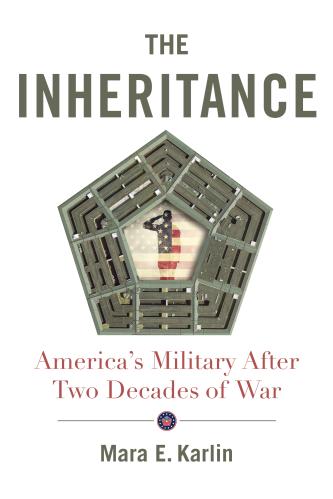

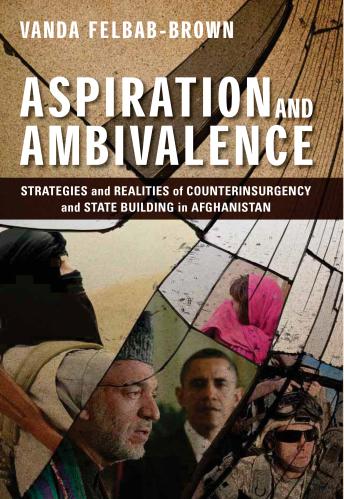
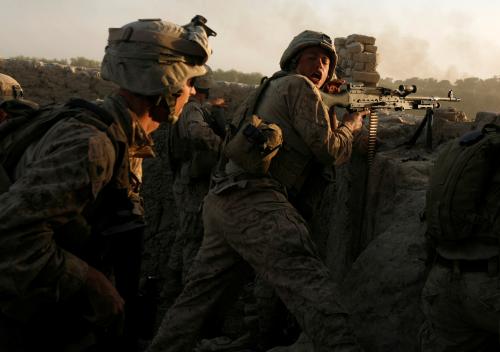
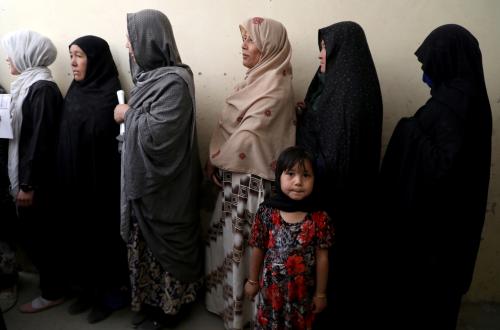





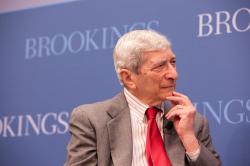









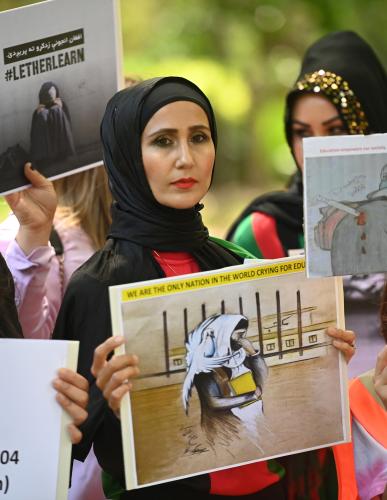
Commentary
Around the halls: The Taliban retakes Afghanistan
August 16, 2021